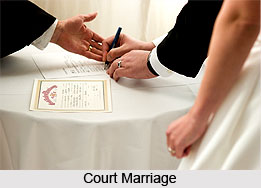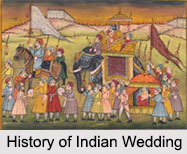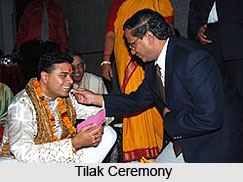 Court marriages are solemnized under the Special Marriage Act, 1954 and all such marriages can take place between any two Indian citizens as well one Indian citizen with a foreigner irrespective of the variation in religion, caste or creed.
Court marriages are solemnized under the Special Marriage Act, 1954 and all such marriages can take place between any two Indian citizens as well one Indian citizen with a foreigner irrespective of the variation in religion, caste or creed.
Court marriage is the secular form of marriage introduced in our country. Such a marriage is solemnized before the marriage officer, registrar often D.C. deputy commissioner of the area. This right is exclusive to Sub registrar or SDM is the marriage officer, registrar only when the already solemnized marriage under any other Act has to be registered. In this case, both or any of the parties involved in such a marriage reside permanently or for at least one month in India.
The financial requirements of such a marriage depend on the rate prevailing in the area. First, both the parties to the marriage file a joint application or notice before the marriage officer along with individual identity, checked and attested by notary public specifying the age of the couple. The boy should be 21years and girl should be of 18yrs. The certificates should state the place of residence, marital status including unmarried or divorcee as the case maybe. Certificates describing the mental status with medical documents should be given. Along with this proof of age (School certificate, Passport, Pan card), proof of residence (Passport, voters ID card, ration card, rent agreement) should be produced.
3 independent adult persons should witness the applications of such a marriage. Although parents are best witnesses, friends and relatives can also fulfill this requirement. The documents should have one photograph of each of the parties and also all the 3 witnesses. On receiving such an application of marriage officer issues a month notice regarding the intended marriage and get such a notice affixed on the notice board just out side his office. A copy of such notice is sent to the marriage officer under whose jurisdiction the other party resides, also a copy is to the individual parties are given.
After expiry of the period of notice the officer and the parties on which all the person`s parties to the marriage and 3 witnesses appear again before the marriage officer who declares them married and then issue a certificate to this regard fix a date. Incase of any objections raised by outsiders, the marriage officer will settle these objections. The objections raised can be regarding the conditions necessary for such marriages.
More on Classification of Marriages
More on Indian Wedding Accessories
More on Indian Religious Weddings
More on Types of Marriages
See also
 Court marriages are solemnized under the Special Marriage Act, 1954 and all such marriages can take place between any two Indian citizens as well one Indian citizen with a foreigner irrespective of the variation in religion, caste or creed.
Court marriages are solemnized under the Special Marriage Act, 1954 and all such marriages can take place between any two Indian citizens as well one Indian citizen with a foreigner irrespective of the variation in religion, caste or creed.



















